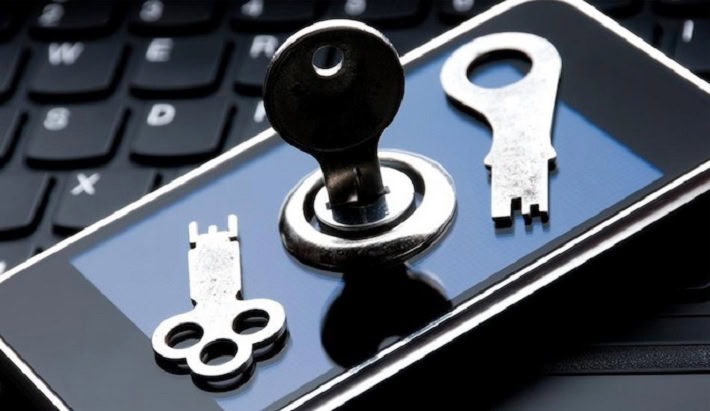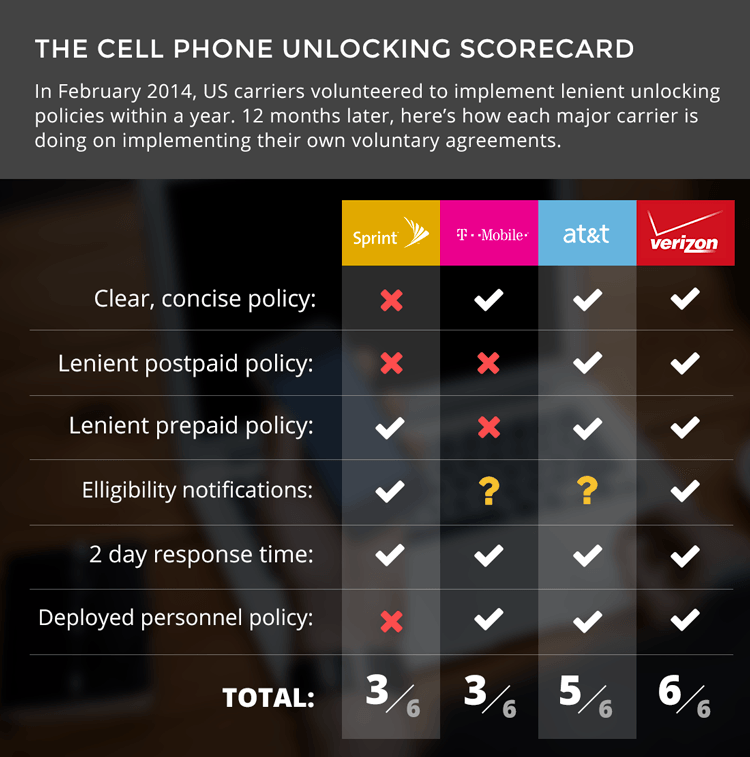Affiliate links on Android Authority may earn us a commission. Learn more.
Report: US carriers are still making it difficult to unlock phones (update)

It used to be illegal to unlock your phones through wireless carriers, but that all changed last week. The FCC and CTIA came to an agreement on February 11th, 2015 that forced carriers to unlock smartphones and tablets upon the user’s request. But according to a new analysis, unlocking smartphones isn’t going as swimmingly as planned.
Sina Khanifar, a consumer rights activist who was a big advocate against phone unlocking restrictions, has rated the four major US carriers (Verizon, AT&T, Sprint and T-Mobile) on phone unlocking restrictions after the agreements passed. Unfortunately, he found that three of the four carriers are still not complying with all regulations set forth by the FCC.
As a quick overview, mobile service providers are now obligated to unlock users’ phones in addition to meeting six conditions. The carriers must:
- Post clear, concise unlocking policies on their websites
- Provide lenient postpaid policies
- Provide lenient prepaid policies
- Provide eligibility notifications to the customer when their devices are able to be unlocked
- Respond to unlock requests within two business days
- Unlock devices to deployed military personnel
Out of the four major US carriers, Verizon complies with all six agreements, AT&T meets five (maybe not the sixth), T-Mobile complies with three (maybe four) and Sprint only meets three of the six guidelines. Khanifar even created a handy chart for a more concise look:

Now, this chart absolutely requires some explanation.
Verizon
Verizon must follow a more strict unlocking policy because of the conditions the FCC posed on the carrier during a spectrum auction. Khanifar says that Verizon has almost completely stopped locking their smartphones, making it easier to unlock devices from here on out. While the carrier passed on the scorecard, Khanifar says it’s still a little too difficult to unlock devices through Verizon. He wrote, “Their Bring Your Own Device” program makes it clear that your phone needs to be a “unused Verizon phone” to be eligible.
AT&T
Moving down the line, AT&T scored quite well on the scorecard. They meet every goal except in providing eligibility notifications to its customers. Khanifar says he was unable to find any notification system on the carrier’s website. On top of AT&T’s site providing unclear results, he spoke to two different customer service representatives, who both gave him conflicting notification delivery methods.
T-Mobile
T-Mobile will unlock postpaid devices, though the carrier posts restrictions on consumers who would like to unlock two devices on the same account within a 12-month period. Postpaid devices on the carrier also need to be active for at least 40 days for the unlocking process to commence. To unlock a prepaid device, the account must be active and in good standing. This means a prepaid device can’t be unlocked if a consumer buys a T-Mobile phone and cancels service within a few months. Additionally, T-Mobile doesn’t notify prepaid or postpaid customers as to when their devices can be unlocked.
Sprint
Last but not least, we have Sprint. The carrier specifically states that they won’t activate a phone that was originally sold by another carrier. Khanifar explains:
In Sprint’s case, those restrictions even apply to their own MVNOs. Virgin Mobile devices run entirely on Sprint’s network. But even if Virgin Mobile unlocks it for you, Sprint won’t activate it for use on a prepaid or postpaid account. It’s patently absurd: there’s simply no good reason to prevent users from bringing their own devices – in fact, it makes it even hard for consumers to switch to your carrier. The only justification for that kind of policy is to gouge customers and force them to buy more expensive, “carrier-approved” devices that come with 2 year contracts.
While Sprint provides unlocking information on their website, it can’t be described as “clear, concise and accessible.” The policy Sprint posted only applies to postpaid devices, and the prepaid device policy is actually a full two links away from the original policy page. For postpaid devices, the carrier will only perform an International SIM Unlock for active customers. Also, customers don’t qualify for an international unlock if they’ve unlocked a device within the last 12 months.
Again, (even for deployed military personnel) the company will refuse to unlock devices if the customer has “previously unlocked another device within the past 12 months.”
What’s the solution?
Khanifar also talks on the Digital Millennium Copyright Act (DMCA), and how exactly Congress needs to revise these “voluntary agreements” that most of the carriers aren’t following. He writes:
There’s a simple and easy fix to all this. Congress could pass a bill clearly stating that it’s not illegal to circumvent a lock as long as there’s no intention of copyright infringement.
This is exactly what the Unlocking Technology Act would have achieved in 2013, but unfortunately the bill was postponed due to “opposition from special interests.”
If you haven’t read Sina Khanifar’s full report on Waveform, you can find it here. What are your thoughts on this analysis? Do you think carriers have a right to interpret the rules differently? Or do you think these conditions should be more closely enforced? Let us know your thoughts in the comments.
Update (2/18):
T-Mobile reached out with us and says that, at least as far as the Uncarrier goes, there are several key points that “are factually incorrect with his analysis”. T-Mobile says that helped drive the unlocking initiative and worked with the CTIA every step of the way to get an industry agreement in place.
Furthermore, T-Mobile asserts that it is 100% in compliance with the CTIA requirements and worked directly with the FCC and CTIA to ensure that their policy was in compliance ahead of the February 11th deadline.
T-Mobile reiterates that it isn’t just in compliance, it is much more lenient than its competitors. For example, it says AT&T requires a 60 day waiting period, while T-Mobile requires only 40 on unlocking postpaid phones. For those looking for more details on exactly what the CTIA requirements are, T-Mobile urges folks to go to the FCC’s website for more information.